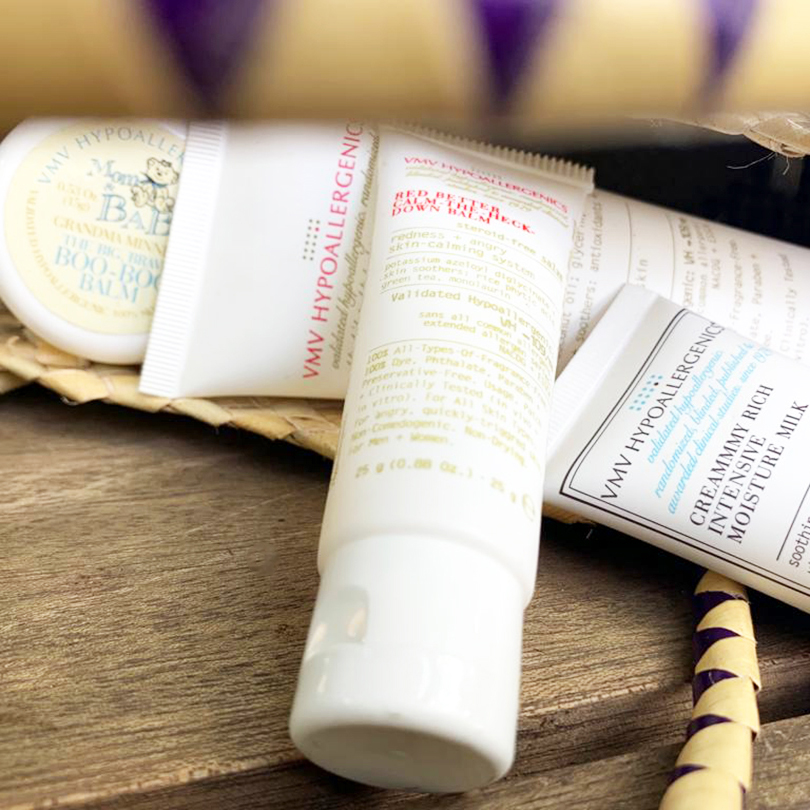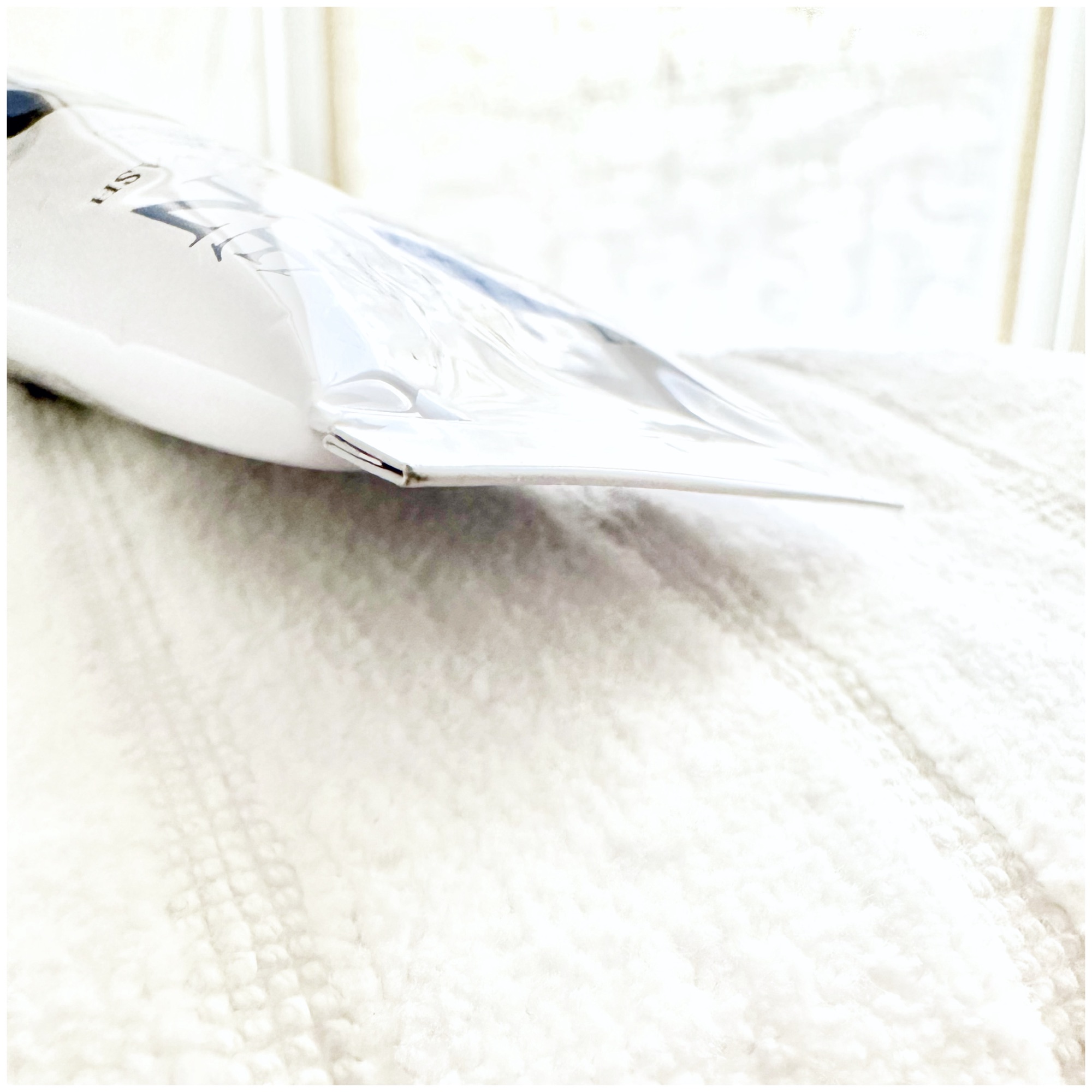Eczema is characterized by inflammation, barrier defect, blistering, itching, and very dry skin. Eczematous skin can get so dry that it cracks…and then microbial infection can become an additional problem.
What to do to keep skin with eczema smooth, happy, and healthy…and steroid free? Let’s start with what not to do.
What To Avoid:
- Harsh soaps;
- Hot water;
- Frequent washing;
- Drying alcohol (not all alcohol is drying);
- Natural remedies (without your doctor’s ok) — many natural ingredients are common contact allergens;
- Using topical steroids every day for a prolonged period of time — this can be dangerous to your skin and cause other serious health problems;
- NOT using topical steroids if prescribed by your doctor;
- Not taking other prescribed medication and not following your doctor’s instructions;
- Using products with allergens, especially perfumes, dyes, preservatives or any other allergen identified by a patch testing.
- Your allergens in everything else: skincare, makeup, shampoo, clothing, digital equipment, plants and fruits, house cleaning products, laundry detergent, room sprays, vaping, scented candles, etc.
Best Practices:
1) Practice Strict Allergen Avoidance.
Contact dermatitis is a common cause of eczema and flare-ups, which is why patch testing is standard in the diagnosis and management of the condition. Once you know what your allergens are, you can avoid them in your skincare, makeup, shampoo, conditioner, clothing, phone cases, house cleaning products and laundry soap, and more.
For more on common allergens, check out our popular Allergen-Not An Allergen tab. For products free of all or most common contact allergens, check out VMVHypoallergenics.com. If you would like customized product recommendations based on your particular patch test results, contact us or drop us a private message on Facebook
2) Less Is More, and Hypoallergenic Is Best.
The fewer products the better, and hypoallergenic products — without the top allergens as published by dermatologists who do lots of patch testing — are the safest options.
3) Your Dermatologist Is A Long-Term Partner, Not A Fling.
Your skin, as with all other organs, changes over time. If your eczema is being managed well, schedule an appointment with your doctor once or twice a year for a general checkup. Your patch test might need to be repeated because you may have developed new allergies (or outgrown others). And of course, follow your doctor’s instructions for flare-ups.
4) PRAM: Prevent, Repair, Antimicrobial, Moisture.
Normalizing eczema means babying your skin:
Prevent:
- Avoid your allergens as strictly as possible.
- Use very gentle cleansers, soaps, lotion…everything. Think “gentle” in terms of textures, too: no rough or abrasive fabrics or materials.
- Look for products that are validated as hypoallergenic and that contain as few ingredients as possible.
- Prevent flare-ups before they can even start by being consistent about your daily care and trying a steroid-free soothing balm or anti-inflammatory balm if you feel that there is a risk of a flare.
Repair:
- The skin’s barrier layer becomes compromised in eczematous skin. Look for moisturizers that provide barrier repair like virgin coconut oil.
- “Repair” here also means: quickly and properly address a flareup should an emergency happen. Your doctor may prescribe a topical steroid for a short amount of time. Immune-modulating and other anti-allergy drugs may be called for if the eczema is generalized or recurrent despite strict allergen avoidance. Antihistamines or centrally-acting medicines can help relieve severe itching.
- Part of repair is normalizing skin quickly after a flare. Early on, apply virgin coconut oil (VCO) to soften the crust as it forms (the crust makes the skin dry, hard and itchy). Keep applying the oil for occlusion, giving skin a secondary barrier against water loss.
Antimicrobial:
Opportunistic bacteria and viruses can enter microscopic cracks in very dry skin to cause a secondary infection. This makes the management of eczema more difficult, and can make itching and dryness worse. Remember that some antimicrobials are allergens, too, so use a non-allergenic option like monolaurin) or ask your doctor for guidance as prescription drugs may be needed for a secondary infection.
Moisturize:
Avoid drying ingredients in skincare and be generous about applying occlusive, healthy moisturizers. It’s so important that layering moisturizers for extra protection is often recommended: follow a daily moisturizer with virgin coconut oil (VCO replaces the fatty acids that make up the skin’s cell walls which are destroyed with inflammation).
How To Care For Skin With Eczema
Based on what we know about eczema, we recommend this daily regimen:
- FACIAL CLEANSING: Red Better Deeply Soothing Cleansing Cream
- SHAMPOO & BODY CLEANSING
- CONDITIONER: Essence Skin-Saving Conditioner
- MOISTURIZERS:
- Creammmy-Rich Intensive Moisture Milk (daily moisturizing for face)
- Grandma Minnie Mommycoddling All-Over Lotion or Essence Hand + Body Smoother (daily moisturizing for face and body)
- Know-It-Oil clinically-validated virgin coconut oil or Grandma Minnie’s Oil’s Well (for when skin is very dry or prone to crusting)
- FOR CRUSTS OR VERY DRY PATCHES: Grandma Minnie’s The Big, Brave Boo-Boo Balm
- FLARE-UP PREVENTION: steroid-free Red Better Calm-The-Heck-Down Balm
- SUN & LIGHT PROTECTION, BARRIER PROTECTION: (physical sunscreens that double as a barrier cream to help prevent contact irritations)
?
Check out the other posts in this series:
Eczema Flare-Up? Here’s What To Do…
 Laura is our “dew”-good CEO at VMV Hypoallergenics and eldest daughter of VMV’s founding dermatologist-dermatopathologist. She has two children, Madison and Gavin, and works at VMV with her sister CC and husband Juan Pablo (Madison and Gavin frequently volunteer their “usage testing” services). In addition to saving the world’s skin, Laura is passionate about health, inclusion, cultural theory, human rights, happiness, and spreading goodness (like a great cream!)
Laura is our “dew”-good CEO at VMV Hypoallergenics and eldest daughter of VMV’s founding dermatologist-dermatopathologist. She has two children, Madison and Gavin, and works at VMV with her sister CC and husband Juan Pablo (Madison and Gavin frequently volunteer their “usage testing” services). In addition to saving the world’s skin, Laura is passionate about health, inclusion, cultural theory, human rights, happiness, and spreading goodness (like a great cream!)







